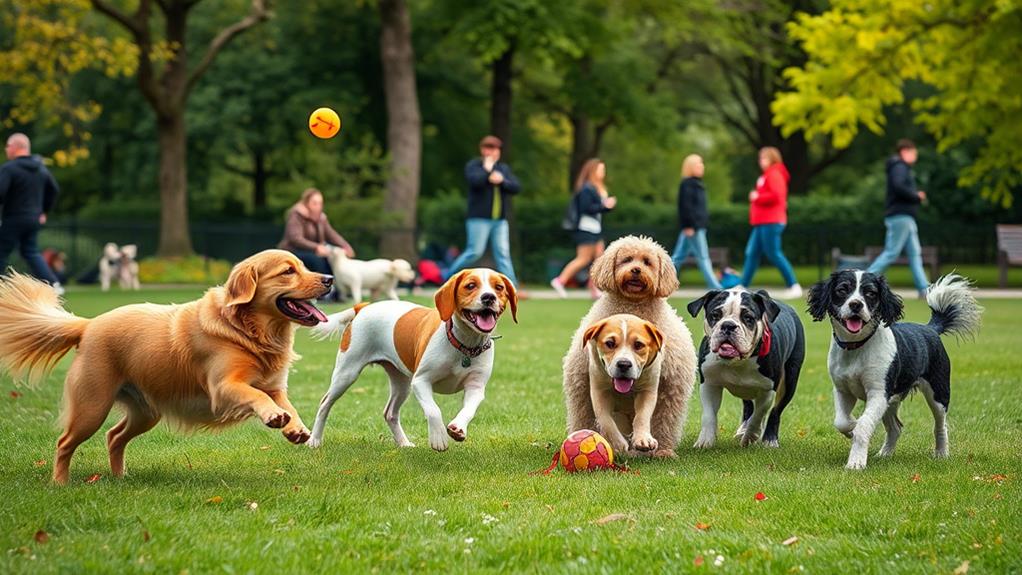Group playtime is a fantastic way to boost your dog's socialization. Start by organizing playdates with compatible pups to guarantee everyone plays well together. Choose safe, fenced locations with plenty of room to run. Engage them in structured games like fetch relays or obstacle courses to foster cooperation and confidence. Always supervise closely, watching for signs of stress or discomfort. Remember to reward positive interactions to encourage good behavior. This experience not only reduces anxiety but helps your dog learn essential skills. Discovering new ways to enhance playtime can take your dog's socialization to the next level.
Benefits of Group Playtime
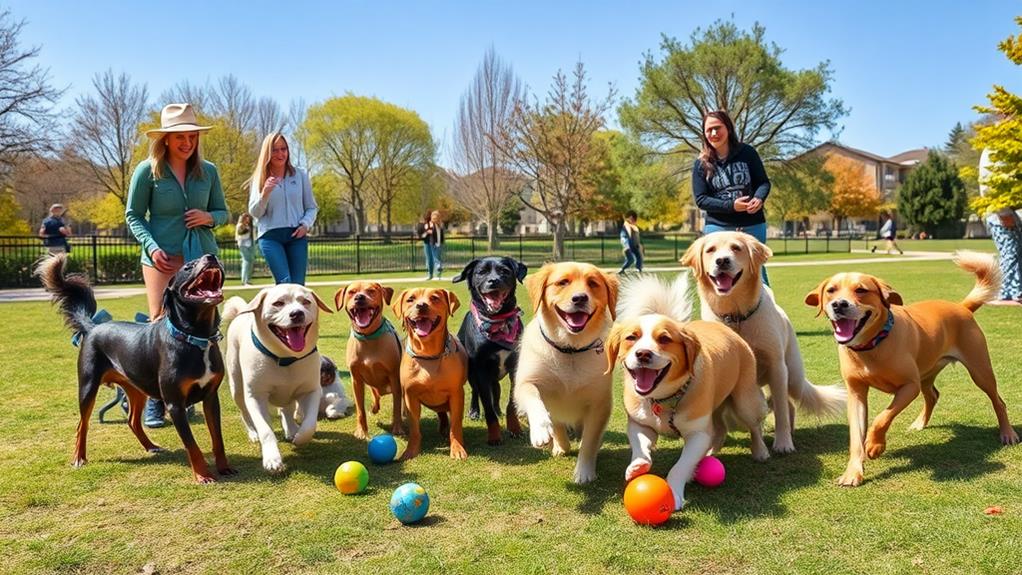
When you take your dog to group playtime, you're not just giving them a chance to stretch their legs; you're also providing valuable socialization opportunities. Interacting with other dogs helps your pup learn essential social skills. They'll practice body language, understand canine etiquette, and develop confidence in various situations.
Group playtime allows your dog to experience different breeds, sizes, and temperaments, which can reduce fear and anxiety around unfamiliar dogs. This exposure is pivotal for developing well-rounded behavior. Plus, engaging in play with other dogs offers mental stimulation, which keeps their minds sharp and satisfied.
You might also notice positive changes in your dog's behavior at home. A well-socialized dog tends to be calmer and more adaptable, making your daily life easier. Regular playdates can also help alleviate issues like excessive barking or destructive behavior, as your dog learns to channel their energy positively.
Lastly, group playtime isn't just beneficial for your dog; it's a great opportunity for you to connect with other dog owners, share experiences, and build a community. So, don't underestimate the power of playtime—it's a win-win for both you and your furry friend!
Choosing the Right Location
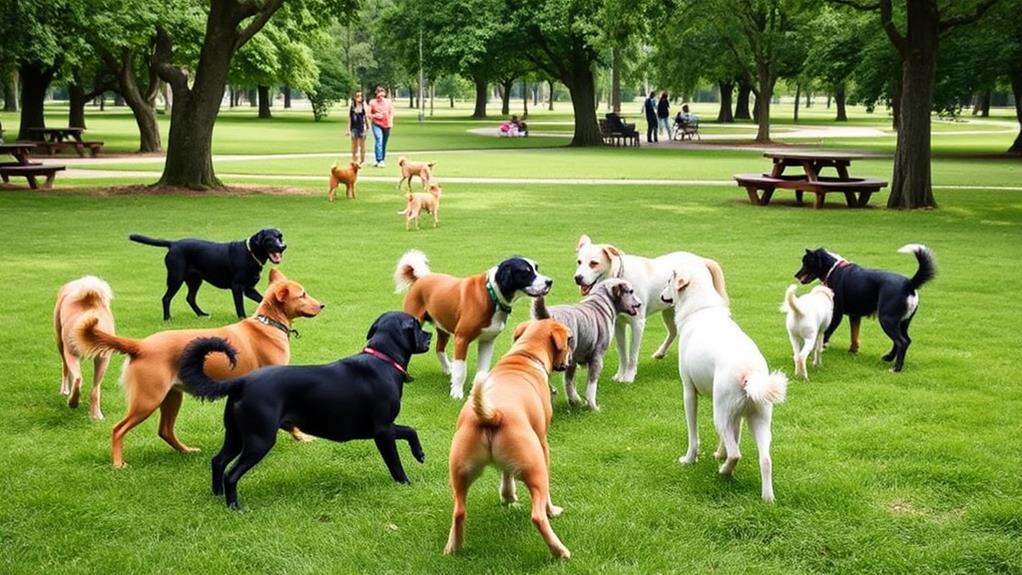
Finding the right location for your dog's socialization is pivotal to ascertain a positive experience. You'll want an area that's safe, spacious, and suitable for various dog sizes and temperaments. Consider these key factors when selecting a spot:
| Factor | Description | Importance |
|---|---|---|
| Safety | Fenced-in areas free of hazards | Prevents escapes and injuries |
| Space | Ample room for running and playing | Encourages active interaction |
| Accessibility | Easy access for you and other owners | Promotes participation |
| Environment | Grass or soft surfaces preferred | Reduces injury risk |
Start by visiting local dog parks, as they often provide a great social environment. If you prefer a more controlled setting, consider renting a private space where you can govern the number of dogs. Remember to check the area for cleanliness and ensure it's free from aggressive dogs. Always stay observant; your goal is to create a comfortable space where dogs can interact positively without feeling overwhelmed. By choosing the right location, you set the stage for successful socialization and joyful playtime.
Setting Up Playdates
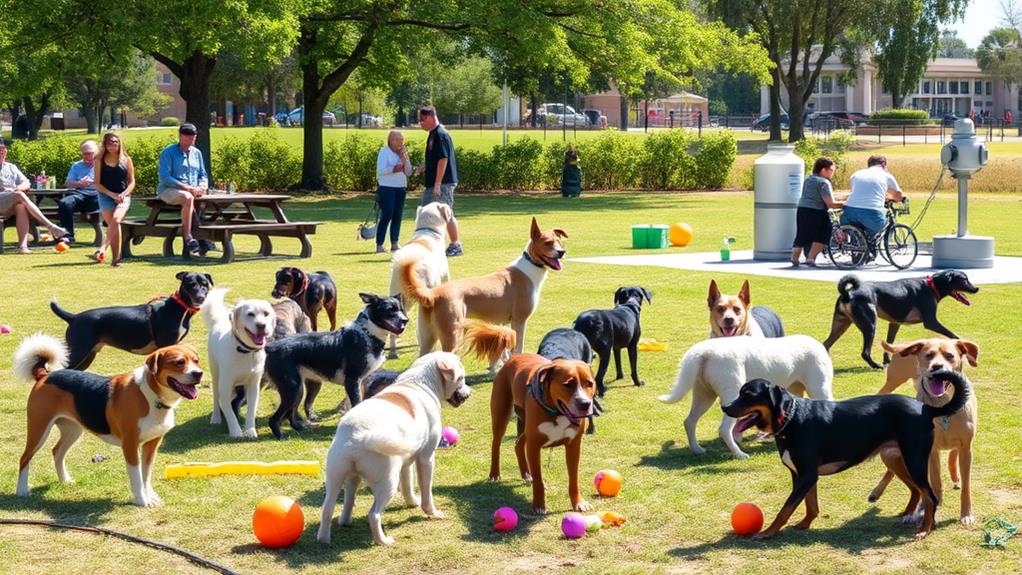
How can you make playdates enjoyable for your dog? First, start by selecting the right playmate. Choose a dog that has a compatible energy level and temperament with yours. If your dog is shy, look for a calm and friendly companion; if they're more energetic, find someone who can keep up with their enthusiasm.
Next, pick a neutral location where both dogs feel comfortable. Avoid areas that could overwhelm either dog, like busy parks. A quiet backyard or a less crowded dog park can be great options.
Before the playdate, confirm both dogs are up-to-date on vaccinations and are healthy. This helps prevent any potential health issues or conflicts. When the day arrives, allow the dogs to meet on neutral ground, letting them sniff and greet each other while you supervise closely.
During the playdate, watch for signs of stress or discomfort in either dog. If you notice any issues, be prepared to intervene. Keep the atmosphere relaxed and fun, and don't forget to bring some toys or treats to reward good behavior! Playdates can strengthen your dog's social skills and create lasting friendships.
Structured Group Games
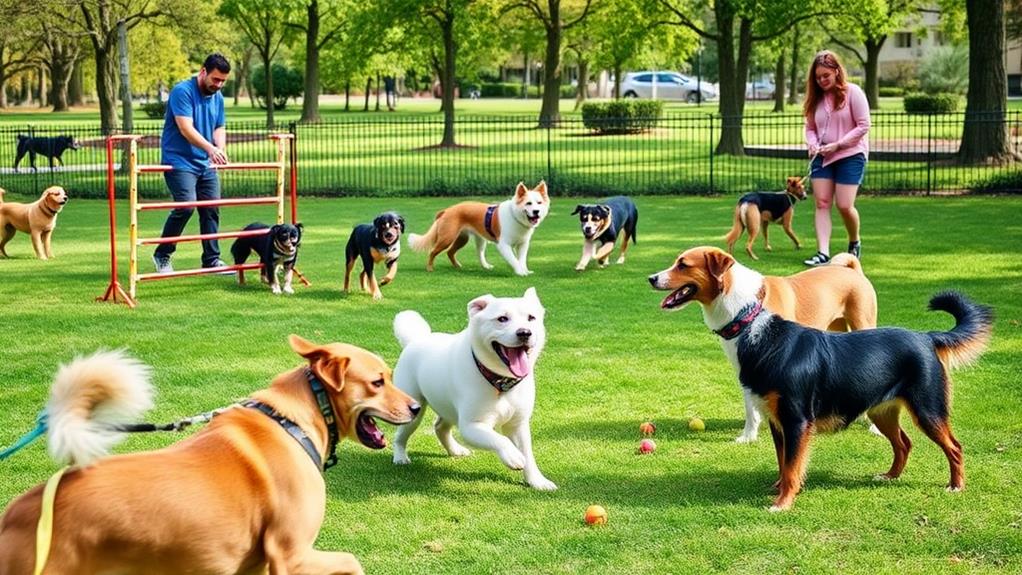
Structured group games can be a fantastic way to enhance your dog's socialization skills while providing physical and mental stimulation. These activities not only help your dog interact with others but also encourage teamwork and communication. You'll love watching your pup thrive in a fun, engaging environment.
Fetch Relay: Dogs work in teams to retrieve toys, promoting cooperation and excitement.
Obstacle Course: Set up a course that challenges dogs to navigate, boosting confidence and agility.
Tug-of-War: Engage in a friendly tugging match, teaching good sportsmanship and impulse control.
Hide and Seek: One person hides while others call their dogs, enhancing focus and recall skills.
Musical Mats: Just like musical chairs, dogs must find a mat when the music stops, developing quick thinking and spatial awareness.
These games not only keep your dog physically active but also help them learn to play nicely with others. You'll notice improvements in their confidence and social skills, making every play session an enriching experience for both you and your furry friend!
Supervised Interaction Techniques
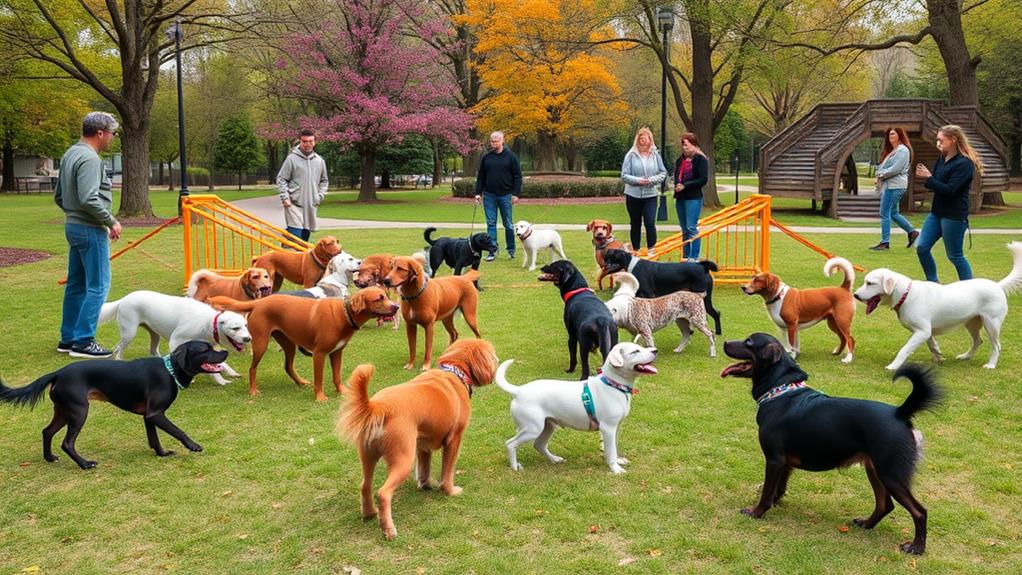
After engaging in structured group games, it's important to focus on supervised interaction techniques to confirm safe and positive experiences for your dog. Start by closely monitoring your dog's body language. Look for signs of comfort, like relaxed ears and a wagging tail, as well as signs of stress, such as tucked tails or growling.
Keep the playgroups small to prevent overwhelming your dog. This way, you can better manage the interactions and verify that each dog is comfortable. Encourage breaks during playtime so your dog can recharge and refocus.
Use positive reinforcement to reward good behavior. If your dog interacts well with others, give praise or treats. This encourages them to engage positively in future interactions.
Introduce new dogs gradually, allowing your dog to sniff and assess before jumping into play. Always have a leash handy for quick control if needed.
Lastly, remain calm and collected. Your demeanor influences your dog's behavior. By using these supervised interaction techniques, you'll help your dog build confidence and social skills in a safe environment, paving the way for enjoyable playdates in the future.
Handling Aggressive Behavior
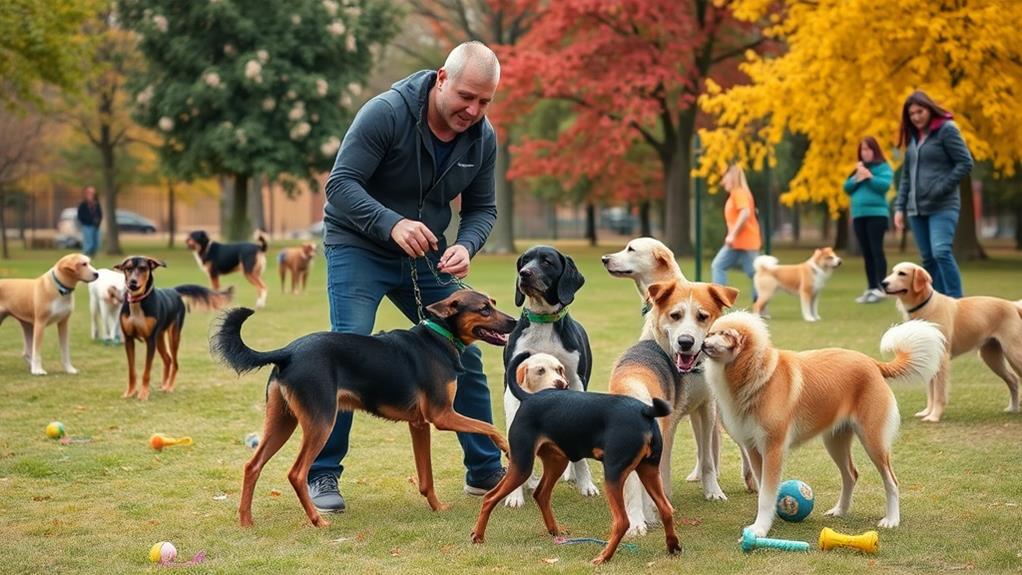
Aggressive behavior in dogs can be concerning and requires timely intervention to prevent escalation. When you notice signs of aggression, it's essential to act quickly. Ignoring the issue can lead to dangerous situations for both your dog and others.
Stay Calm: Your dog can sense your emotions, so maintain a calm demeanor to avoid escalating the situation.
Identify Triggers: Pay attention to what causes your dog to act aggressively; it could be other dogs, certain noises, or specific situations.
Use Commands: Train your dog to respond to commands like "sit" or "stay" to redirect their focus and diffuse tension.
Create Distance: If your dog is aggressive towards another dog, increase the space between them to prevent a confrontation.
Seek Professional Help: Don't hesitate to consult a professional trainer or behaviorist if aggressive behavior persists.
Encouraging Positive Play
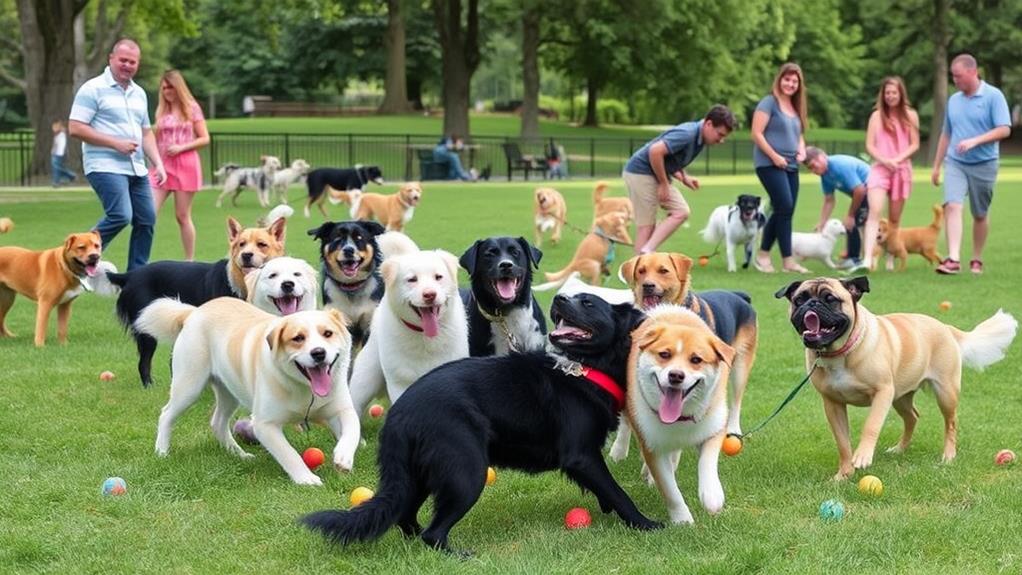
Regularly encouraging positive play in dogs is essential for their social development and overall well-being. You can foster a fun environment by selecting suitable playmates who share similar energy levels and play styles. When you notice your dog engaging in friendly behaviors—like wagging their tail, bowing, or playfully barking—praise and reward them. This reinforces their positive interactions.
To promote healthy play, introduce games that require teamwork, such as fetch or tug-of-war. Guarantee that each dog gets a turn to play, so no one feels left out. Keep an eye on their body language; if any dog shows signs of stress or discomfort, intervene promptly and redirect their attention.
Set up playdates with well-socialized dogs that can model appropriate behaviors. You might also consider structured group classes that focus on socialization through guided play.
Socialization for Puppies
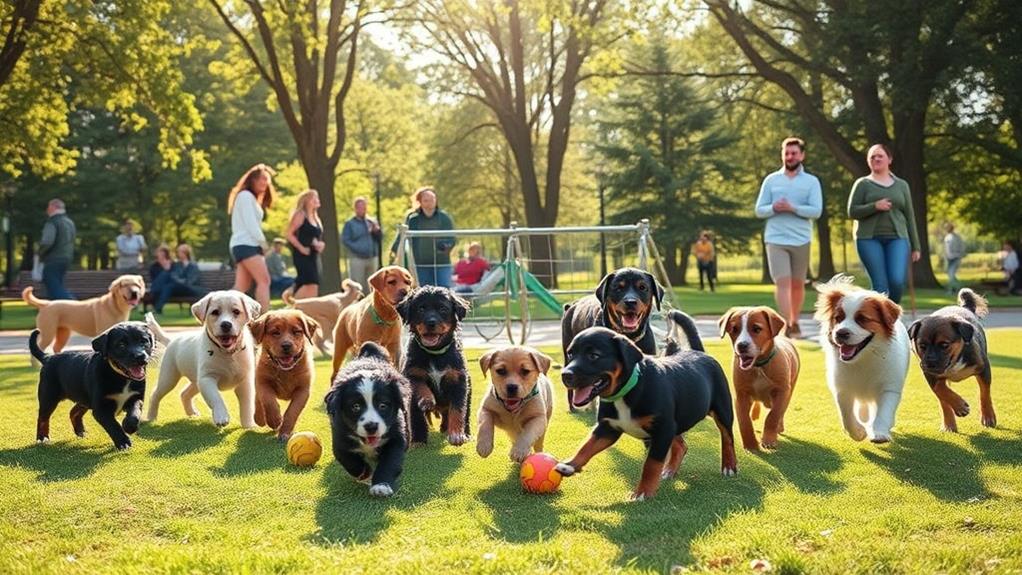
Socializing puppies is an essential part of their development and can set the stage for a well-adjusted adult dog. The early months of your puppy's life are vital for shaping their behavior and confidence. Engaging in socialization activities helps them learn how to interact with other dogs, people, and different environments.
Puppy classes: These structured environments offer supervised play with other puppies, building their confidence and social skills.
Meet new friends: Arrange playdates with other vaccinated puppies or friendly adult dogs to expose them to various play styles.
Explore different environments: Take your puppy to parks, pet-friendly stores, or busy streets to help them adapt to various sights and sounds.
Introduce new people: Let your puppy meet different individuals, including children, to help them feel comfortable around diverse groups.
Positive reinforcement: Reward your puppy for calm and friendly behavior during interactions, reinforcing good social habits.
Seasonal Group Activities
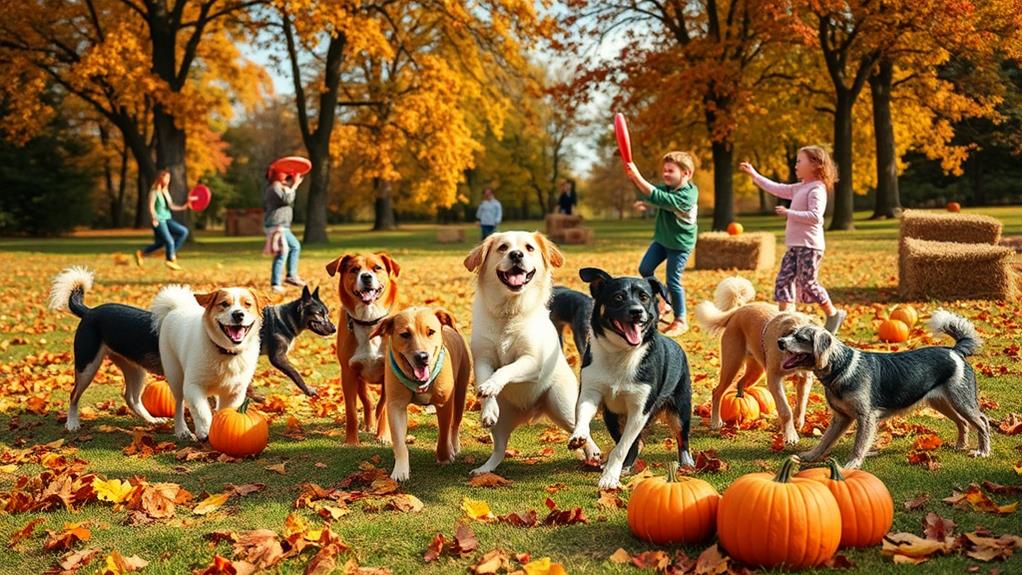
Joining seasonal group activities can be a fantastic way to enhance your dog's socialization while enjoying time outdoors. Whether it's spring, summer, fall, or winter, there are plenty of opportunities for you and your pup to engage with other dogs and their owners.
Joining seasonal group activities can be a fantastic way to enhance your dog's socialization while enjoying time outdoors. Whether it's spring, summer, fall, or winter, there are plenty of opportunities for you and your pup to engage with other dogs and their owners.
| Season | Activity | Benefits |
|---|---|---|
| Spring | Group Nature Walks | Builds confidence and teamwork |
| Summer | Beach Playdates | Encourages exercise and play |
| Fall | Pumpkin Patch Visits | Stimulates senses and curiosity |
| Winter | Snow Play and Socialization | Promotes fun and bonding |
These activities not only allow your dog to interact with others but also help build your relationship with your pet. You'll get to meet fellow dog owners, share experiences, and even exchange tips on training and care. By participating in these seasonal events, you're giving your furry friend a chance to thrive in a a vital environment, which is important for their overall development. So, grab your leash, find a group, and get ready for some seasonal fun!
Monitoring Dog Body Language
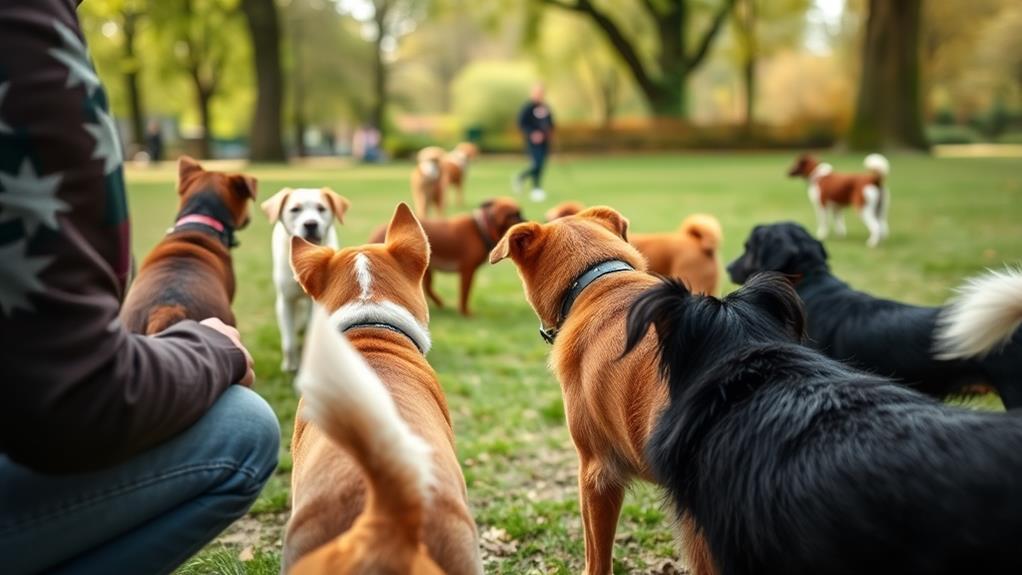
Understanding your dog's body language is crucial for effective communication and guaranteeing their comfort during social interactions. By observing their signals, you can create a more enjoyable experience for both your dog and their playmates. Here are some key signs to watch for:
- Relaxed posture: A loose, wiggly body indicates your dog feels safe and happy.
- Tail wagging: A wagging tail, especially at a medium height, often shows excitement and friendliness.
- Play bow: When your dog lowers their front legs while keeping their rear up, it's an invitation to play.
- Ears position: Forward ears suggest curiosity, while ears pinned back can indicate submission or fear.
- Growling or barking: These vocalizations can signal excitement or discomfort, so pay attention to the context.
Being attentive to these cues helps you gauge how your dog interacts with others. If you notice signs of stress, like stiff body language or excessive panting, it might be time to intervene. By monitoring your dog's body language, you guarantee a positive social experience, allowing them to thrive in group play settings.
Frequently Asked Questions
How Often Should I Schedule Group Playtime for My Dog?
You should schedule group playtime for your dog at least once or twice a week. Regular interaction with other dogs keeps them socialized, helps reduce anxiety, and promotes good behavior. Consistency is key for their development.
Can Older Dogs Benefit From Group Playtime?
Absolutely, older dogs can benefit from group playtime! It helps keep them active, stimulates their minds, and enhances social skills. Just monitor their energy levels and guarantee the environment is safe and comfortable for them.
What Toys Are Best for Group Play Sessions?
What's more enticing than a game of tug-of-war? For group play sessions, interactive toys like balls, frisbees, and puzzle toys work wonders. They keep dogs engaged and encourage social interaction, making playtime memorable and fun!
How Do I Introduce My Dog to New Playmates?
To introduce your dog to new playmates, start slowly. Let them sniff each other while on leashes, observing body language. Gradually allow off-leash interaction in a safe space, ensuring both dogs feel comfortable and relaxed.
Are There Specific Breeds That Socialize Better in Groups?
Aren't you curious about which breeds thrive in group settings? Generally, herding breeds like Border Collies and Retrievers tend to socialize better. However, individual temperament plays a pivotal role, so observe your dog closely.
Conclusion
Incorporating group playtime into your dog's routine can be a game-changer for their socialization. Just like a well-worn VHS tape, these moments create lasting memories and strengthen bonds with both dogs and their owners. By choosing the right setting, facilitating fun games, and keeping an eye on body language, you're setting the stage for joy and connection. So, gather your furry friends and watch them thrive in a world of wagging tails and happy barks!

